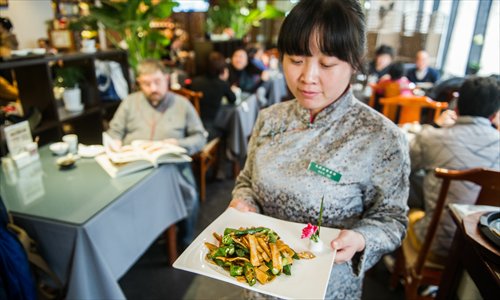

Although there remains a resistance to vegetarianism in China, the number of vegetarian restaurants in the country have grown steadily in the past decade. Photos: Li Hao/GT
Growing awareness
Tang Li, the chairman of the Chinese Society of Vegetarians, said that the reason for shoddy service for vegetarians in China was because there were fewer vegetarians compared to other countries. The concept of vegetarianism, he said, had not yet entered the mainstream consciousness.
"In China, vegetarianism is generally a privileged choice for a small group of people, who choose this lifestyle due to health considerations, environmental concerns or religious beliefs," Tang said.
According to a survey published by the International Vegetarian Union in 2011, only 1 percent of Chinese consider themselves to be vegetarian. In comparison, 6 percent of Britons, 40 percent of Indians, and 3 percent of people in the US identify as being vegetarian, according to a report published by raw-food-health.net in 2006.
"In Western countries, most people choose to become vegetarian because they are against animal cruelty, and because the breeding and keeping of livestock uses a significant amount resources, to the detriment of the environment," Tang said.
In China however, the right to eat meat was considered to be sacred, said Tang. According to him, many Chinese people still remember living through periods when food was extremely scarce, like the Great Leap Forward (1958-61). "The memory of famine has led Chinese people today to consider meat a necessity of life. This also explains why small pieces of meat are often added to vegetable dishes or soups in Chinese cooking," said Tang.
However, awareness about vegetarianism is gradually improving in China, said Gao. There are a number of NGOs dedicated to promoting vegetarianism as an ethical lifestyle choice, such as the Chinese Society of Vegetarians, the Chinese Vegetarian Union and Biechipengyou ("Don't eat friends"), and according to Gao, the number of vegetarian restaurants in Beijing has increased from around 5 to more than 100 over the last decade.
According to Stessan, non-vegetarian restaurants are also getting better at catering to the needs of vegetarians.
"Most regular restaurants around Tsinghua University can cook a perfect vegetarian dish as long as you tell them you don't eat meat," said Stessan. As restaurants have gained more experience serving vegetarians, they have gotten better at accommodating customers' needs, Stessan added.
How to be vegetarian in China
After Mao's botched dining experiences, she has chosen to cook for herself as much as possible. She frequently goes to organic food markets for her vegetables, and hosts dinner parties for her friends at home rather than going out to eat.
When she does decide to eat out, Mao generally chooses vegetarian restaurants. She noted however, that this wasn't a tenable option for those who wanted to eat out regularly, due to cost and the limited number of vegetarian restaurants.
"From my experience, it can cost between 100 yuan ($16.29) and 200 yuan per person for a proper meal [at a vegetarian restaurant]. That's pretty high for a Chinese person on an average income," she said.
For vegetarians who want to be able to eat regularly at non-vegetarian restaurants, Snyder suggested keeping a list of spots around the city where the waitstaff are patient and attentive enough to meet the needs of vegetarians, and are familiar with the ingredients in their dishes.
"You can also try to learn more Chinese words, and ask about the details of a dish relentlessly," said Snyder. "Does it have meat juice in it? Does it have chicken cubes in it?"
Another alternative, said Snyder, was to only order dishes that one is certain contain no meat. "I just stick to some dishes I know for sure are vegetarian, such as disanxian [sauteed potatoes with green pepper and eggplant] and scrambled eggs with tomato. The options are very limited, but it's sufficient to feed me," said Snyder.
"As for details such as [meat residue] in the broth or on the utensils, my suggestion is don't get too picky."
Copyright ©1999-2018
Chinanews.com. All rights reserved.
Reproduction in whole or in part without permission is prohibited.